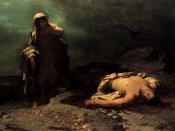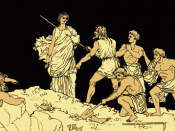In Sophocles's inferential play, Antigone, two sisters, Antigone and Ismene, are caught in a feud on whether to bury their brother, Polynices, even if it means going against the law and facing the death penalty. Antigone's, uncle, King Creon, ordered Eteocle's, Antigones brother, buried in an august fashion, but left Polynices to rot. Furthermore, any who attempted to bury him would be put to death. The two brothers were clashing on who should take the throne, and both die in the process. In this tragic play, Both Antigone and Creon can be considered tragic heroes. A tragic hero is someone whose intentions are noble but whose flaws lead them to their downfall. Here both Antigone and Creon portray noble intention but yet have flaws which lead to there demise.
Antigone is the plays tragic heroine. In the first couple of moments in the play she is very annoyed by her sister Ismene and gets in a little quarrel with her about Polynices. Antigone is mercurial, thin, and resistant to being like the other girls. One-way Antigone portrayed her self to be a tragic hero was when she put her family over the law. Antigone knew that if she would not bury her beloved brother, Polynices, than his soul would wander around and he wouldn't ever be able to get to heaven. A problem that she faces is that her uncle, King Creon, put up a law saying that anyone caught trying to bury Polynices would be subject to the death penalty. Even though Antigone was well aware of the danger she was putting her self in she still valued her family over the law and that made her a hero. She portrays this courageous act when she screams to Creon, " I dared [defy...


